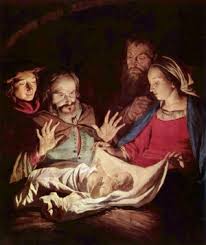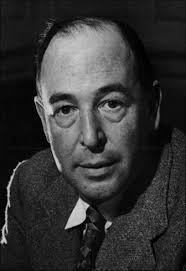Glory to God in the highest and on earth peace, good will toward men.And it came to pass, as the angels were gone away from them into heaven, the shepherds said one to another,
Let us now go even unto Bethlehem, and see this thing which is come to pas, which the Lord hath made known unto us.
 And they came with haste, and found Mary, and Joseph and the babe lying in a manger. And when they had seen it, they made known abroad the saying which was told them concerning this child. And all they that heard it wondered at those things which were told them by the shepherds. But Mary kept all these things, and pondered them in her heart. And the shepherds returned, glorifying and praising God for all the things that they had heard and seen, as it was told unto them. (The Gospel According to Luke, Chapter Two, Verses 13-20)
And they came with haste, and found Mary, and Joseph and the babe lying in a manger. And when they had seen it, they made known abroad the saying which was told them concerning this child. And all they that heard it wondered at those things which were told them by the shepherds. But Mary kept all these things, and pondered them in her heart. And the shepherds returned, glorifying and praising God for all the things that they had heard and seen, as it was told unto them. (The Gospel According to Luke, Chapter Two, Verses 13-20)Here we are again, on the first day of the Christmas season. It has become something of a Christmas tradition for me to engage the following text from C.S. Lewis in connection with the above quoted Scriptures. The reason will be obvious.
Nearly every Christmas, it seems, NEWSWEEK or TIME or some television special will featre the "latest scholarship" concerning the "authenticity" of the Christmas story. The scholarly authorities cited are consistently and incorrigibly one-sided, usually including scholars like John Dominic Crossan who dissent from Church teaching, or more ostensibly mainline scholars like Raymond E. Brown (now deceased) who have been quite thoroughly corrupted by the Humean philosophical presuppositions of the historical-criticism of the biblical narrative. Several years ago we saw the Archbishop of Canterbury, Rowan Williams, call the Christmas story a 'legend' ("Archbishop says nativity 'a legend,'" London Telegraph, December 12, 2007). And more recently I've notice that About.com, a site which Internet browsers frequent to learn "the facts" about this or that, has taken up this partisan skeptical slant in Austin Cline's article, "Nativity vs Gospels: Are the Gospels Reliable About Jesus' Birth?" (About.com), suggesting that all the key ingredients of the Nativity story in the Gospels were concocted fictions of various kinds.
The lack of critical circumspection in all of this would be amusing if it were not so destructive. The upshot is always the same: that the Gospel writers are unreliable and not to be trusted, and certainly not to be taken at face value. Just how ludicrous this all is, however, can be seen by anyone with a bit of intelligence and familiarity with literature, mythology, and history.
 One of the best examples of a powerful antedote to this kind of foolishness -- and one I keep using because it is simple -- is a little essay by C.S. Lewis entitled "Modern Theology and Biblical Criticism," which is available in a collection of essays by Lewis entitled Christian Reflections
One of the best examples of a powerful antedote to this kind of foolishness -- and one I keep using because it is simple -- is a little essay by C.S. Lewis entitled "Modern Theology and Biblical Criticism," which is available in a collection of essays by Lewis entitled Christian Reflections1. [If a scholar] tells me that something in a Gospel is legend or romance, I want to know how many legends and romances he has read, how well his palate is trained in detecting them by the flavour...For further reading:
I have been reading poems, romances, vision-literature, legends, myths all my life. I know what they are like. I know that not one [of the stories in the Gospel of John, for example] is like this... Either this is reportage - though it may no doubt contain errors - pretty close up to the facts; nearly as close as Boswell. Or else, some unknown writer in the second century, without known predecessors or successors, suddenly anticipated the whole technique of modern, novelistic, realistic narrative...
2. All theology of the liberal type involves at some point - and often involves throughout - the claim that the real behaviour and purpose and teaching of Christ came very rapidly to be misunderstood and misrepresented by his followers, and has been recovered or exhumed only by modern scholars... The idea that any... writer should be opaque to those who lived in the same culture, spoke the same language, shared the same habitual imagery and unconscious assumptions, and yet be transparent to those who have none of these advantages, is in my opinion preposterous. There is an a priori improbability in it which almost no argument and no evidence could counterbalance.
3. Thirdly, I find in these theologians a constant use of the principle that the miraculous does not occur... This is a purely philosophical question. Scholars, as scholars, speak on it with no more authority than anyone else. The canon 'if miraculous, unhistorical' is one they bring to their study of the texts, not one they have learned from it. If one is speaking of authority, the united authority of all the Biblical critics in the world counts here for nothing.
4. My fourth bleat is my loudest and longest. Reviewers [of my own books, and of books by friends whose real history I knew] both friendly and hostile... will tell you what public events had directed the author's mind to this or that, what other authors influenced him, what his over-all intention was, what sort of audience he principally addressed, why - and when - he did everything... My impression is that in the whole of my experience not one of these guesses has on any one point been right; the method shows a record of 100 per cent failure.
The 'assured results of modern scholarship', as to the way in which an old book was written, are 'assured', we may conclude, only because those who knew the facts are dead and can't blow the gaff... The Biblical critics, whatever reconstructions they devise, can never be crudely proved wrong. St. Mark is dead. When they meet St. Peter there will be more pressing matters to discuss.
However... we are not fundamentalists... Of course we agree that passages almost verbally identical cannot be independent. It is as we glide away from this into reconstructions of a subtler and more ambitious kind that our faith in the method wavers... The sort of statement that arouses our deepest scepticism is the statement that something in a Gospel cannot be historical because it shows a theology or an ecclesiology too developed for so early a date...
Such are the reactions of one bleating layman... Once the layman was anxious to hide the fact that he believed so much less than the Vicar; he now tends to hide the fact that he believes so much more...
- Jesus Seminar critically examines (edited by Pertinacious Papist)
- C.S. Lewis, Christian Reflections,
edited by Walter Hooper.
- If you're interested in reading the relevant chapter from Lewis's book online, click on: "Modern Theology and Biblical Criticism"
- Pope Benedict XVI's 2010 Christmas message in full (The Telegraph, December 25, 2010).
- "Urbi et Orbi Message of His Holiness Pope Benedict XVI: Christmas 2007"
- Pope Benedict's Christmas Message to the Roman Curia, 2008
- Pope Benedict's Christmas Message: "I Once More Joyfully Proclaim Christ's Birth" (December 25, 2008)
- Pope Benedict's 2009 Christmas message, "God Is Important, by Far the Most Important Thing in Our Lives" (December 24, 2009) [delivered at the Christmas Vigil Mass in St. Peter's after being physically assaulted.
- Pope Benedict XVI's Christmas Address to the Roman Curia (December 21, 2012).
- Pope Benedict XVI's annual Christmas Urbi-et-Orbi message from Vatican City (December 24, 2012).
- Pope Benedict denounces gay marriage during his annual Christmas message (Daily News, December 22, 2012).

As Belloc wrote:
ReplyDeleteNoel, Noel, Noel, Noel,
May all my enemies go to Hell.
That aside, this is an excellent and timely post, Dr. I love it and I want to throw-in this lil' contribution:
There are, roughly, 666 million evangelicals who spend their Christmas season trying to disprove the accurate historical date of The Incarnation by citing the Shepherds in the field and claiming that "it was too cold" and so that proves Jesus wasn't born on the 25th and that date really is the date of Sol Invictus which means the Catholic Church is suffused with paganism blah, blah, blah...
Well, here is an impeachable source in that the source is Jewish and he wrote a book (I think it was more'n 100 years ago) that proves that there WERE shepherds in the field with their flocks at that time - and that they were their tending their sheep who were intended for sacrifice - talk about an unintended proof of birth of The Saviour, The Lamb of God, who was to die for our sins as an act of propitiation....
In any event, here is Edelsheim: Alfred Edersheim, in his "The Life and Times of Jesus"
And yet Jewish tradition may here prove both illustrative and helpful. That the Messiah was to be born in Bethlehem, was a settled conviction. Equally so, was the belief , that He was to be revealed from Migdal Eder, 'the tower of the flock.' This Migdal Eder was not the watchtower for the ordinary flocks which pastured on the barren sheepground beyond Bethlehem, but lay close to the town, on the road to Jerusalem. A passage in the Mishnah [951] leads to the conclusion, that the flocks, which pastured there, were destined for Temple-sacrifices [952], and, accordingly, that the shepherds, who watched over them, were not ordinary shepherds. The latter were under the ban of Rabbinism, on account of their necessary isolation from religious ordinances, and their manner of life, which rendered strict legal observance unlikely, if not absolutely impossible. The same Mishnaic passage also leads us to infer, that these flocks lay out all the year round, since they are spoken of as in the fields thirty days before the Passover -- that is, in the month of February, when in Palestine the average rainfall is nearly greatest.
Thus, Jewish tradition in some dim manner apprehended the first revelation of the Messiah from that Migdal Eder, where shepherds watched the Temple-flocks all the year round. Of the deep symbolic significance of such a coincidence, it is needless to speak.
It was, then, on that ‘wintry night’ of the 25th of December, that shepherds watched the flocks destined for sacrificial services, in the very place consecrated by tradition as that where the Messiah was to be first revealed.
Dear "I Am Not Spartacus,"
ReplyDeleteI think you mean "unimpeachable" source, but the Edelsheim quote is profound indeed, particularly with reference to the fact that the sheep were indended for sacrifice!
I also dearly love the Belloc jingle, which perfectly coincides with my slightly twisted sense of humor (which does often -- in the interest of full disclosure -- get me into trouble).
As I understand it he thought that the French Revolution was peachy keen. He doesn't seem to have been filled with anything like the milk of human kindness. "Love your enemies"
ReplyDeleteDonna
Dear Dr. Yes, I intended unimpeachable; thanks.
ReplyDeleteBTW, the book is online as a PDF